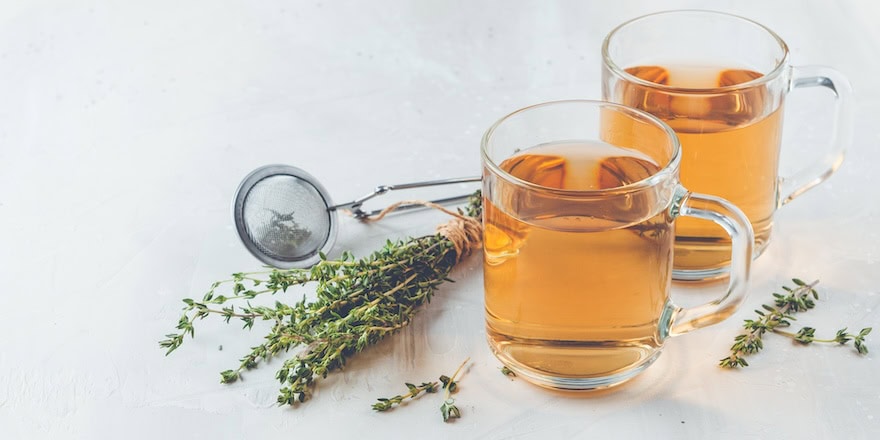Thyme, or Thymus vulgaris L. in its scientific name, is an emblematic Mediterranean plant, just like mint and rosemary.
Traditionally used since Antiquity as an antiseptic and antispasmodic, it is also used in cooking to flavor dishes and add a sunny touch to the plate.
There are many varieties: common thyme, lemon thyme, thymol thyme, and also linalool thyme, whose chemical composition varies according to the climate, the soil and its harvest period.
Whether in the form of tea, extract, or essential oil, it is credited with many properties, particularly for the respiratory and digestive systems.
For my part, I consume it every day. But what does science really say about it?
What does a cup of thyme infusion contain?
When you infuse thyme, you extract into the water some of the active compounds:
- phenols and flavonoids (apigenin, luteolin, thymosin), powerful antioxidants
- phenolic acids (rosmarinic acid, caffeic acid), with anti-inflammatory properties
- volatile aromatic compounds (thymol, carvacrol, etc.) whose antimicrobial activity has already been demonstrated by studies
- tannins
- traces of minerals
Does thyme act on respiratory comfort?
A plant recognized by the ANSM
Thyme is traditionally used to soothe productive (chesty) coughs, ease the throat in case of a cold and make expectoration easier.
Moreover, it is among the plants with recognized use by the ANSM for “mild respiratory tract conditions”.
I’ve gathered here what scientific studies show. This study conducted on 60 asthmatic children showed that after taking thyme-based syrup every 8 hours, effort-induced coughing decreased, compared with a placebo group.
Similarly, this research also showed an improvement in the fluidity of bronchial secretions and better oxygen saturation after thyme inhalation in patients on mechanical ventilation.
Its mechanisms of action
The mechanisms of action that explain the benefits of this plant are thought to be in particular related to:
- the antimicrobial action of thymol and carvacrol observed against certain respiratory pathogens
- the expectorant and mucolytic action found in the studies cited just above
Nevertheless, I did not find any scientific study that explicitly talks about thyme herbal tea. Most of the research focuses on syrups, concentrated aqueous extracts, or essential oils. In other words, forms that are much richer in active compounds than an infusion.
We can therefore assume a more modest effect with the herbal tea.
Stocking up on antioxidants and boosting well-being thanks to thyme?
Thyme is a plant that is particularly rich in polyphenols, notably thanks to flavonoids as well as phenolic compounds.
Now, polyphenols are powerful antioxidants that help neutralize free radicals. These molecules, which can be produced by stress, pollution, or an unbalanced diet, can accumulate and promote chronic inflammation and premature aging of cells.
More clearly: regular consumption of thyme could help protect the body’s cells from this oxidative stress.
I actually found some studies that clearly support this antioxidant potential of thyme, even though once again these involve concentrated extracts and essential oil.

Thyme infusion and the digestive tract: a helping hand for discomfort?
A traditional remedy… but poorly documented
Thyme is often seen as a good remedy to soothe stomach pain, reduce bloating, and make it easier to eliminate intestinal gas.
Despite this well-known traditional use, I have not found results from clinical studies regarding thyme infusion, but rather on essential oils or concentrated extracts.
This study tested an aqueous extract of thyme (without essential oil, 600 mg/day) and observed an improvement in gastrointestinal symptoms, an increase in stool frequency and a change in the composition of the intestinal microbiota. These results suggest a beneficial effect on digestive comfort and are promising, but still need to be confirmed.
Also, models in rats have shown that the aqueous extract of Thymus vulgaris could improve gastric and intestinal motility and reduce certain signs of constipation or delayed gastric emptying.
Finally, this study on commercial thyme preparations shows a beneficial effect on dyspepsia and digestive discomfort in women suffering from primary dysmenorrhea compared to a standard pain-relief treatment.
What mechanisms are involved?
Regarding its mechanism of action, the digestive properties of thyme could be linked to:
- to thymol and carvacrol, which are believed to help with the relaxation of smooth muscles in the digestive tract (antispasmodic effect)
- to flavonoids, known for their anti-inflammatory and antioxidant properties
So the data are promising, but no real clinical study currently allows us to state with certainty that thyme tea has a digestive effect comparable to that observed with concentrated extracts or essential oil.
📚 Read also | The best probiotics according to a doctor
And what about immunity?
Thyme is often cited as an immune stimulant. Unfortunately, most of the evidence comes from animal or aquaculture studies.
In carp, the addition of thyme extract improves certain immune markers, such as the increase of antioxidant enzymes, for example. This therefore suggests a potential to support the body’s natural defenses.
But is this really transferable to humans? For now, I have not found any genuine studies on the subject that confirm this benefit. It therefore remains an interesting hypothesis that should be explored further.
How many cups of thyme can you have each day?
If you’re wondering how many cups of thyme you can drink without risk, the answer isn’t set in stone: there is no single official recommendation.
On the side of the European monographs, an infusion is prepared with 1 to 2 g of dried plant per cup, and 3 to 4 cups per day can be used for their expectorant effects. Depending on the form and indication, the EMA gives a wider range, 3 to 8 g of dried plant per day.
In France, the ANSM does not impose a precise dose for homemade herbal tea, and allows a margin of up to 3 cups per day.
In other words, if you prepare a classic infusion at home, 1 to 3 cups per day should be enough to benefit from the virtues of thyme.
Sources and scientific studies
- Seyed Mohammad Nabavi et al. (2015) Plants belonging to the genus Thymus as antibacterial agents: From farm to pharmacy
- Elnaz Eskandarpour et al. (2023), Thymus vulgaris ameliorates cough in children with asthma exacerbation: a randomized, triple-blind, placebo-controlled clinical trial
- A. Ghahremani-Chabok (2021), The effects of Thymus vulgaris inhalation therapy on airway status and oxygen saturation of patients under mechanical ventilation: A randomized clinical trial
- Fani M, Kohanteb J. (2017) In Vitro Antimicrobial Activity of Thymus vulgaris Essential Oil Against Major Oral Pathogens.
- Patil SM, Ramu R, Shirahatti PS, Shivamallu C, Amachawadi RG. (2021) A systematic review on ethnopharmacology, phytochemistry and pharmacological aspects of Thymus vulgaris
- Mohamed Hussein Hamdy Roby (2013) Evaluation of antioxidant activity, total phenols and phenolic compounds in thyme (Thymus vulgaris L.), sage (Salvia officinalis L.), and marjoram (Origanum majorana L.) extracts
- Katharina Knaub (2022) Effects of a Food Supplement with a Wild Thyme (Thymus serpyllum L.) Extract on Gut Health and the Microbiome in Humans: A Randomized, Double-Blinded, Placebo-Controlled Clinical Trial
- Rtibi K, Selmi S, Wannes D, Jridi M, Marzouki L, Sebai H. (2019) The potential of Thymus vulgaris aqueous extract to protect against delayed gastric emptying and colonic constipation in rats.
- Direkvand-Moghadam A, Khosravi A. (2012) The impact of a novel herbal Shirazi Thymus vulgaris on primary dysmenorrhea in comparison with the classical chemical ibuprofen.
- Begrow, F., Engelbertz, J., Feistel, B., Lehnfeld, R., Bauer, K., & Verspohl, E. J. (2010). Impact of thymol in thyme extracts on their antispasmodic action and ciliary clearance.
- Patil SM, Ramu R, Shirahatti PS, Shivamallu C, Amachawadi RG. (2021) A systematic review on ethnopharmacology, phytochemistry and pharmacological aspects of Thymus vulgaris
- Hamed Ghafarifarsani et al. (2022) The Effects of Dietary Thyme Oil (Thymus vulgaris) Essential Oils for Common Carp (Cyprinus carpio): Growth Performance, Digestive Enzyme Activity, Antioxidant Defense, Tissue and Mucus Immune Parameters, and Resistance against Aeromonas hydrophila



